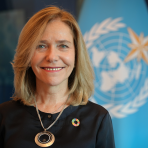Opening Remarks at the UN Member States Briefing on Early Warnings for ALL
Excellencies, colleagues, and partners,
Thank you for joining us today to accelerate this collective journey, which is ambitious, urgent and essential: delivering Early Warnings for All.
In two weeks’ time, Early Warnings for All will take centre stage at the World Meteorological Organization’s Extraordinary Congress. It will be preceded by a ministerial-level event to celebrate WMO’s 75th anniversary under the theme of Science for Action.
Early Warnings for All embodies that theme. It is Science FOR Action and Science IN Action. UN Secretary-General Antonio Guterres will make a keynote address at Congress – proof of the importance of our work for global well-being and security.
Where do we stand at the half-way stage of Early Warnings For All – launched by Mr Guterres in 2022?
The good news is that we have made great progress. Early Warnings for All is now more than an initiative. It is a brand for global solidarity. An upcoming WMO assessment shows that coverage has nearly doubled since 2015. Fewer lives are being lost. We have expanded beyond the initial 30 countries and embraced new partners. We are leveraging regional centers and strong South-South cooperation. National ownership remains at the heart of our work, with governments in the driving seat.
Initiatives such as the Climate Risk and Early Warning Systems Initiative and Systematic Observations Financing Facility are vital enablers, and we are deeply grateful for Member States’ continued support to them.
The bad news is that big gaps remain. The forthcoming report on the 2025 Global status of multi-hazard early warning systems shows that disaster mortality is six times higher and the number of people affected is four times higher in countries with limited coverage.
So it is clear that we need to go further. We need to go faster and we need to go together. We need urgent action and stronger investment to close the protection gap.
The risks are real, as highlighted in recent weeks by devastating rainfall, floods and landslides in China, India, Indonesia, Nepal, Pakistan, Viet Nam and a number of other countries.
In all cases, National Meteorological and Hydrological Services issued multiple alerts and warnings, helping authorities evacuate communities and save lives. Without these authoritative warnings from hydrometeorological agencies, the human and economic toll would be far greater.
Excellencies, distinguished guests, colleagues,
At the recent UN General Assembly, I proposed that we commit to three essential actions, and I repeat those today.
First, we must close observation and data gaps and strengthen financing for early warning systems. This is not a cost but an investment.
Second, we must integrate early warning systems into all Nationally Determined Contributions and national adaptation plans. This should be a priority for COP30.
Third, we must strengthen cross-sector collaboration and anticipatory action to reach the last mile to ensure no one is left behind.
I appeal for even greater commitment: more political will, more investment, and more partnerships; so that every community, everywhere, can benefit from timely, life-saving early warnings.
Let us use today’s event as a springboard to think bigger, act faster, and collaborate better. Together, we can make Early Warnings for All a reality.
Thank you.
Statement by


